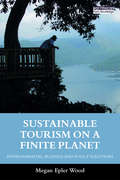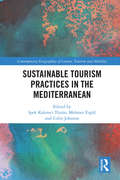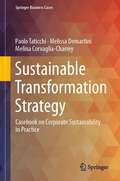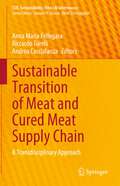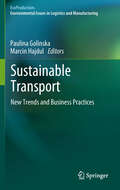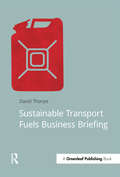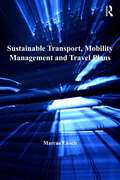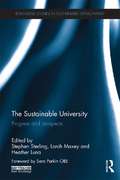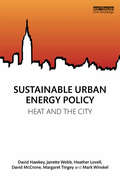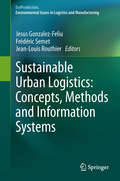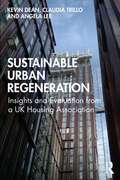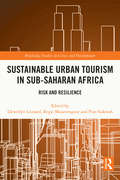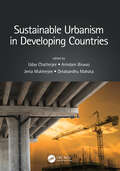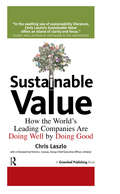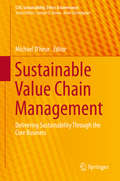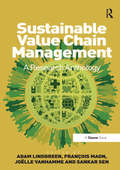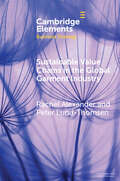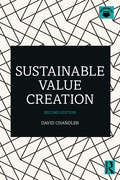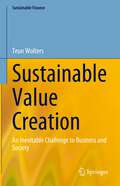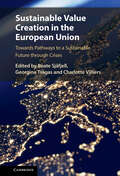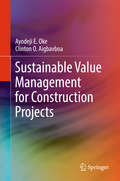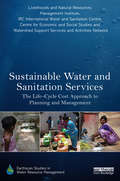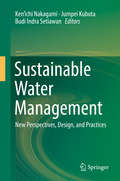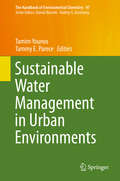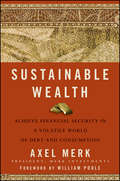- Table View
- List View
Sustainable Tourism on a Finite Planet: Environmental, Business and Policy Solutions
by Megan Epler WoodThis book helps all those involved in international tourism develop the new skills, tools and investments required to protect irreplaceable global resources from the impacts of escalating tourism demand over the next 50 years. It documents how technology and the growing global middle class are driving a travel revolution which requires a new paradigm in managing tourism destinations. Travel and tourism supply chains and business models for hotels, tour operators, cruise lines, airlines and airports are analysed and environmental management techniques are proposed for each sector. A pragmatic set of solutions are offered to support the transition to lower impact tourism development worldwide. It recommends that decision makers assess the current and future value of natural, social, and cultural capital to guide investment in destinations and protect vital resources. Case studies illustrate why budgets to protect local destinations are consistently underestimated and offer guidance on new metrics. Innovative approaches are proposed to support the transition to green infrastructure, protect incomparable landscapes, and engage local people in the monitoring of vital indicators to protect local resources. It provides students, professionals, and policy makers with far-reaching recommendations for new educational programs, professional expertise, financing, and legal frameworks to lower tourism’s rapidly escalating carbon impacts and protect the health and well-being of local populations, ecosystems, cultures, and monuments worldwide.
Sustainable Tourism Practices in the Mediterranean (Contemporary Geographies of Leisure, Tourism and Mobility)
by Ipek Kalemci Tüzün Mehmet Ergül Colin JohnsonSustainable Tourism Practices in the Mediterranean showcases and examines the current and future trends in sustainable tourism in this popular region where tourism is one of the leading determinants of economic development. This volume examines the effects of specific recent events including terrorism, financial crises and various political changes in the Mediterranean region. Looking at a range of destinations, island and mainland, urban and rural, summer and winter and emergent and declining zones, it provides a comprehensive overview of this area. It also draws on a number of wide-ranging themes such as gastronomy, (corporate) social responsibility, entrepreneurship, ethical issues, service quality, health and the slow city, offering an insightful study of the challenges the Mediterranean region faces and the sustainable practices that can be implemented in order to overcome them. Written by leading academics in the field, this book will be of great interest to upper-level students, researchers and academics in Tourism, Development Studies and Geography.
Sustainable Transformation Strategy: Casebook on Corporate Sustainability in Practice (Springer Business Cases)
by Paolo Taticchi Melissa Demartini Melina Corvaglia-CharreyThis casebook demonstrates how companies can design and execute corporate sustainability strategies into their overall business strategy to achieve sustainable transformation. It offers a set of case studies from different industrial sectors such as aerospace and defence, beauty, energy, engineering and construction, fashion retail, financial services, food and hospitality, life sciences, motorsports, pharmaceutical, software, toy production. Each story presents practical and concrete actions taken by companies to develop their sustainability strategies, as well as challenges and issues faced during the process. Concluding with best practices emerging from the cross-case analysis, this book is beneficial for sustainability and management professionals, students and scholars.
Sustainable Transition of Meat and Cured Meat Supply Chain: A Transdisciplinary Approach (CSR, Sustainability, Ethics & Governance)
by Anna Maria Fellegara Riccardo Torelli Andrea CaccialanzaThis edited volume provides an innovative perspective on the future of food systems. The contributors analyse relevant issues for a sustainable and responsible food consumption and cover fundamental steps for a broader approach to the sustainability of meat-based products. The book presents several issues and solutions to engage food firms in a measurable ecological transition. Topics discussed include not only the pedagogical perspective on sustainable food consumption, the evolution of (meat-based) food production systems and the animal welfare perspective, but also the adaptation of firm’s strategies to the sustainable transition, the effects of climate change on agri-food firms’ governance structures and the evolution of consumers perceptions on meat-based products and the role of CSR labels. This book targets managers and entrepreneurs who work in the meat industry and are seeking to improve their socio-environmental performance and governance, accountants that works at the production of sustainability reports for food companies, researchers working at the cutting edge of the food and environmental fields, professionals working in the meat industry and researchers interested in the investigation of novelties in European food regulation.
Sustainable Transport: New Trends and Business Practices
by Paulina Golinska Marcin HajdulThe aim of the book is to present the emerging environmental issues in organization and management of transport logistics. The scope of the book includes set of solutions which show different stakeholders' viewpoints on sustainability. It points out how the transport operations organized and conducted in companies and regions might be consistent with the concept of sustainable development. The scope of the book takes into consideration trade-off relations between actors directly and indirectly involved in transport networks. Therefore, the authors present, in individual chapters, innovative approach to eco-friendly organization and coordination of transport processes, as well as management of transport networks.
Sustainable Transport Fuels Business Briefing
by David ThorpeSustainable Transport Fuels Business Briefing explains, for a global business audience, the latest developments in the world of sustainable transport. Not the vehicles or modes of transport themselves, but their means of propulsion.New technologies and players are coming and going with bewildering speed. Some observers are putting their money on electric vehicles, others on hybrids; some see electric vehicles as a mere stepping stone to hydrogen-powered fuel cell vehicles, already being seen on city streets. The mere mention of biofuels often provokes fierce arguments about their sustainability, yet they, too, are here to stay and will be filling more and more fuel tanks.By the time you finish this book, you will understand not only the pros and cons of all these technologies, the programmes around the world furthering their development, and the players large and small, but also the catalysts for change, and the successful partnerships and innovative business models being employed.You’ll be able to make informed decisions about investments, whether you’re considering a new fleet, haulage or mobility of any kind, or whether to install an electric vehicle charging point in your property.
Sustainable Transport, Mobility Management and Travel Plans (Transport And Mobility Ser.)
by Marcus EnochCharting the development of the travel plan as a concept, this book draws on a range of research-based contributions to determine the state-of-the-art and to explore a series of future scenarios in this area for practitioners and policy makers. Site-based mobility management or 'travel plans' address the transport problem by engaging with those organisations such as employers that are directly responsible for generating the demand for travel, and hence have the potential to have a major impact on transport policy. To do this effectively however, travel plans need to be reoriented to be made more relevant to the needs of these organisations, whilst the policy framework in which they operate needs modifying to better support their diffusion and enhance their effectiveness. Marcus Enoch breaks down the travel plan concept into four axes related to its development (namely segment, scale, structure and support), and investigates the following questions: - What makes them special? - Why are they introduced? - What do they look like in terms of their design and the measures they use? - How common are they and in what sectors and location types? - How effective are they? - What barriers do they face and how might these be overcome?
The Sustainable University: Progress and prospects (Routledge Studies in Sustainable Development)
by Stephen Sterling Larch Maxey Heather LunaThe direction of higher education is at a crossroads against a background of mounting sustainability-related issues and uncertainties. This book seeks to inspire positive change in higher education by exploring the rich notion of the sustainable university and illustrating pathways through which its potential can be realised. Based on the experience of leading higher education institutions in the UK, the book outlines progress in the realisation of the concept of the ‘sustainable university’ appropriate to the socioeconomic and ecological conditions facing society and graduates. Written by leading exponents of sustainability and sustainability education, this book brings together examples, insight, reflection and strategies from the experience of ten universities, widely recognised as leaders in developing sustainability in higher education. The book thus draws on a wealth of experience to provide reflective critical analysis of barriers, achievements, strategies and potential. It critically reviews the theory and practice involved in developing the sustainable university in a systemic and whole institutional manner, including the role of organisational learning.While remaining mindful of the challenges of the current climate, The Sustainable University maps out new directions and lines of research as well as offering practical advice for researchers, students and professionals in the fields of management, leadership, organisational change, strategy and curriculum development who wish to take this work further.
Sustainable Urban Energy Policy: Heat and the city (Routledge Studies in Energy Policy)
by Mark Winskel Janette Webb David McCrone David Hawkey Heather Lovell Margaret TingeyMinimising the most severe risks of climate change means ending societal dependence on fossil fuels, and radically improving the efficiency with which we use all energy sources. Such deliberate transformative change is, however, without precedent. Sustainable Urban Energy Policy debates the major public issue of developing a sustainable, clean and affordable energy system by adopting a distinctive focus on heating in cities. In this way, the book constructs an original account of clean energy policy, politics and provision, grounded in new empirical data derived from case studies of urban and multi-level governance of sustainable heat and energy saving in the UK and Europe. Offering an original conceptual framework, this study builds on socio-technical studies, economic and urban sociology, human geography, applied economics and policy studies in order to understand energy governance and systemic change in energy provisions. This book is a valuable resource for students and academics in the areas of Science and Technology Studies, Sociology, Geography (Urban Studies) and Political Economy as well as energy policy makers, social housing providers and energy practitioners.
Sustainable Urban Logistics: Concepts, Methods and Information Systems
by Jesus Gonzalez-Feliu Frédéric Semet Jean-Louis RouthierSince the 1990's, researchers, practitioners and public administrations have given more thought to urban logistics. However, their interests and goals are not the same, and several approaches do not produce efficient logistics systems as a result. This book aims to provide both a conceptual framework for urban logistics planning and management and to create a basis for deploying solutions that aim to reduce the main nuisances related to urban goods. The proposed book is divided in two parts. The first proposes a set of methodological chapters, written by key authors, which aim to support decision makers in their current choices related to urban logistics. In addition to public authorities' aims and goals, the book highlights the importance of private actors, and shows how supply chain management can deal with the problems of the last urban mile and its integration in global logistics chains. The second presents several applied research works that deal with current planning and practice issues in urban logistics, such as the role of city planning, the place of night deliveries in carrier organization, the limits of logistics pooling, and the real estate market, among others. The book was written by key authors, all having considerable research experience and recognised as experts in their respective fields. Each chapter presents methods and results of research works, written for a broad audience, and more precisely directed to both academics and practitioners.
Sustainable Urban Regeneration: Insights and Evaluation from a UK Housing Association
by Kevin Dean Claudia Trillo Angela LeeThis book provides a deep insight into urban regeneration schemes and explores the parameters of what is deemed a sustainable development, before appraising existing schemes’ evaluation models for the sustainable return on investment. The authors present a new practical evaluation tool that suggests quantifiable benefits for all urban regeneration stakeholders. This new method enables the gauging of the full sustainable impact, from a given outlay of money invested in a housing-led urban regeneration scheme, through an evidence-based proof and can be used to: Better fulfil sustainability criteria in terms of all three aspects of the triple bottom line and contribute in a more sustainable way to address the United Nation’s Sustainable Development Goal 11 Reduce financial waste and plug the gap created by the recent economic shortfall which is impacting on housing associations, tenants and communities alike Evaluate historical housing-led urban regeneration schemes and model future schemes. The method can be used as a strategic decision making or management tool, with schemes being able to be planned in, prioritised or carried out in a targeted and strategic manner; and it can be used for modelling purposes, for publicity purposes and alongside existing tools. This book provides a unique method of fully and sustainably evaluating housing-led urban regeneration schemes, useful for planners, strategic management, local authorities, housing associations, the construction industry and built environment students alike.
Sustainable Urban Tourism in Sub-Saharan Africa: Risk and Resilience (Routledge Studies in Cities and Development)
by Llewellyn Leonard Regis Musavengane Pius SiakwahThis book investigates urban tourism development in Sub-Saharan Africa, highlighting the challenges and risks involved, but also showcasing the potential benefits. Whilst much is written on Africa’s rural environments, little has been written about the tourism potential of the vast natural, cultural and historical resources in the continent’s urban areas. Yet these opportunities also come with considerable environmental, social and political challenges. This book interrogates the interactions between urban risks, tourism and sustainable development in Sub-Saharan African urban spaces. It addresses the underlying issues of governance, power, ownership, collaboration, justice, community empowerment and policies that influence tourism decision-making at local, national and regional levels. Interrogating the intricate relationships between tourism stakeholders, this book ultimately reflects on how urban risk can be mitigated, and how sustainable urban tourism can be harnessed for development. The important insights in this book will be of interest to researchers and practitioners across Tourism, Geography, Urban Development, and African Studies.
Sustainable Urbanism in Developing Countries
by Uday Chatterjee Arindam Biswas Jenia Mukherjee Dinabandhu MahataThe mushrooming of illegal housing on the periphery of cities is one of the main consequences of rapid urbanisation associated with social and environmental problems in the developing countries. Sustainable Urbanism in Developing Countries discusses the linkage between urbanism and sustainability and how sustainable urbanism can be implemented to overcome the problems of housing and living conditions in urban areas. Through case studies from India, Indonesia, China, etc., using advanced GIS techniques, this book analyses several planning and design criteria to solve the physical, social, and economic problems of urbanisation and refers to urban planning as an effective measure to protect and promote the cultural characteristics of specific locations in these developing countries. FEATURES Investigates an interdisciplinary approach to urbanism, including urban ecology, ecosystem services, sustainable landscapes, and advanced geographical systems Analyses unique case studies of rapid urbanisation from a local to a national scale in countries such as India, Sri Lanka, China, Bangladesh, Malaysia, and Indonesia and their global impact Examines the use of GIS and spatial statistics in analysing urban sprawl and the massive amount of data gathered by every operational activity of municipalities Focuses on the holistic perspective of sustainable urbanism and the harmony in the human–nature relationship to achieve sustainable development Covers a wide range of issues manifested in urban areas with economic, societal, and environmental implications contributed by leading scholars from the Global South
Sustainable Value: How the World's Leading Companies Are Doing Well by Doing Good
by Chris Laszlo Patrick CescauA small but influential group of mainstream global industry leaders are now reinventing the role of business in society. They are shifting the focus away from minimizing negative impacts to offering new solutions to global problems that the public sector has been unable to tackle alone. In this new competitive environment, societal challenges such as climate change or the alleviation of global poverty are not only risks, but huge business opportunities, not only for niche players, but for mainstream business. These leaders are creating "Sustainable Value". They are creating it through the provision of value to both their shareholders and their stakeholders – an ever-growing list of diverse constituents impacted by the social, environmental, and financial performance of global business. In short, they are doing well by doing good. In this outstanding book, Chris Laszlo defines, illustrates, and shows how business can action 'Sustainable Value' in three profoundly different ways. First, a management fable looks at the experiences of a dynamic business leader as she grapples with the new business realities of managing stakeholder, as well as shareholder pressures. Second, with the real thing – inside stories from some of the largest corporations in the world that are successfully integrating sustainability into their core activities, not only from a sense of moral correctness, but because it makes good business sense. And, finally, with frameworks, tools, and methods that will make sustainable value creation concrete for business practitioners everywhere. This book is a masterful synthesis – part novel and part executive briefing – a refreshing kind of prophetic pragmatism, helping leaders anticipate and see the future in the context of the actual. In Sustainable Value Chris Laszlo speaks with resounding clarity to the living challenges, the real dilemmas, and haunting questions of CEOs everywhere.
Sustainable Value Chain Management
by Michael D'HeurThis book introduces the integrated management concept of "Sustainable Value Creation", which delivers sustainability 'inside-out' from the core business. It is based on the premise that sustainability can provide a platform for growth, if it is implemented in a company's products, services and supply chains (combined also known as the 'Value Chain'). Managing the Value Chain from the outset with a sustainability mindset subsequently allows profitable economical, ecological and societal growth. It combines the need for increased sustainability and its implementation in the operations of a company. The book addresses the following issues: How do economic, environmental and societal factors impact the value-creation process of a company? What requirements and expectations need to be met to balance economic, ecologic and societal value creation? What are the building blocks and measures that can be utilized on the journey towards building a sustainable value chain? What benefits can be achieved through sustainable value chains? What are the practical examples of sustainable value chains in leading companies that can inspire others to follow? The book includes contributions from the following organisations and companies: Beiersdorf, SAP, Klenk und Hoursch, VAUDE, Infineon Technologies, Independent Capital Management, BASF, Nanogate, the Federal German Council for Sustainable Development, Henkel, Symrise, shared. value. chain, Siemens, Fairphone and Thin Air Factory
Sustainable Value Chain Management: A Research Anthology
by François Maon Sankar SenThe way organizations manage their value chain has changed dramatically over the past decade. Today, organizations take account of economic issues, but they also adopt a broader perspective of their purpose including social and environmental issues. Yet despite its global spread, sustainable value chain management remains an uncertain and poorly defined ambition, with few absolutes. The social and environmental issues that organizations should address easily can be interpreted as including virtually everything. Current literature on the topic seeks to understand the effects and management of initiatives dealing with diversity, human rights, safety, philanthropy, community, and environment. However, the penetration of social and environmental considerations into value chain management is described as ’desire lacking reality’ thereby making the idea a patchy success. The objective of this research anthology is to investigate different angles of sustainable value chain management. The book’s 27 chapters fill holes and explore new fields; the chapters are organised in five sections: Sustainable value chains - context, drivers, and barriers; Sustainable value chains - managing activities; Sustainable value chains - managing networks and collaboration; Sustainable value chains - integrative perspectives; and Sustainable value chains - specific sectorial and industry perspectives.
Sustainable Value Chains in the Global Garment Industry (Elements in Business Strategy)
by Rachel Alexander Peter Lund-ThomsenThe widespread prevalence of economically, socially, and environmentally unsustainable practices in global value chains is a pressing international challenge. The way to improve systems and practices in the complex networks that characterize contemporary production processes is not clear cut. Finding solutions requires innovation. This Element examines the structures of garment value chains and explores how innovation related to sustainability is taking place in these chains. Furthermore, it identifies barriers and opportunities for innovations to break through and stimulate industry-wide change.
Sustainable Value Creation: Stakeholders, Globalization, And Sustainable Value Creation
by David ChandlerThe framework presented in this book, Sustainable Value Creation, is the result of more than twenty years thinking and writing at the intersection of two subjects, strategy and CSR. I teach strategy and I think about CSR, almost constantly. Given my academic home in the business school, I appreciate the importance of markets and the ability of their essential actors (for-profit firms) to create value. Equally, of course, I see the ability of firms to destroy value, on an all-too-frequent basis. As such, I have spent a lot of time thinking about how to promote the beneficial work firms do and eradicate the harm. The result is this book: a framework through which managers can understand the essential purpose of the for-profit firm, the most powerful entity we have devised to drive societal progress. At its core, this book is structured around the ten principles that define Sustainable Value Creation. The foundation for these principles is a pragmatic philosophy, oriented around stakeholder theory and designed to appeal to managers skeptical of existing definitions of CSR, sustainability, or business ethics. It is also designed to stimulate thought within the community of academics committed to these ideas, but who approach them from more traditional perspectives. Ultimately, therefore, this book aims to reform both business practice and business education. By building a theory that redefines CSR as central to everything the firm does (as opposed to peripheral practices that can be marginalized), these ten principles redefine how firms approach each of their operational functions, but also how these subjects should be taught in universities worldwide. As such, this book will hopefully be of value to instructors as a complement to their teaching, students as a guide in their education, and managers as a framework to help them respond to the complex, dynamic context that they are expected to navigate every day.
Sustainable Value Creation: An Inevitable Challenge to Business and Society (Sustainable Finance)
by Teun WoltersSustainability sheds a whole new light on economic value creation. Sustainable value creation means looking critically at both revenues and costs. Not everything that makes money is of value. Not everything for which no bill is sent is 'free'. This book explains how this is the case and what it means to incorporate sustainability into a company’s strategy and manage activities based on sustainable principles. At the same time, it keeps an eye on the broader societal context in which companies operate, such climate change policies, the SDGs and ESG finance. Since the launch of the concept of sustainable development, many policies at various institutional levels have focused on reducing environmental damage and social ills. This book reflects this broader context. However, despite many serious efforts, it cannot be denied that these policies do not stand up against continued economic growth and a growing global population. This is why this book also stresses that more radical approaches are needed for a successful transformation towards a sustainable society. Businesses should not be content to wait and see what lies ahead. They need to proactively take ownership of the change process that is needed.The book has eight chapters that discuss the various aspects of sustainable value creation from different points of view, including sustainable management and chain management as well as sustainable accounting and reporting. It gives a concise but well-underpinned picture of what sustainable business means today.
Sustainable Value Creation in the European Union: Towards Pathways to a Sustainable Future through Crises
by Beate Sjåfjell Georgina Tsagas Charlotte VilliersThe European Union Treaty after Lisbon emphasises the overarching objectives of sustainable development and a highly competitive social market economy, aiming at full employment, high levels of environmental protection and social progress. Yet, in 2022, it is clear that these ambitions have not been fully achieved. The ongoing pandemic, the continuing fall-out from Brexit and the resulting economic damage, a Grexit avoided, and potential other exits from the EU, have come to undermine the political consensus of the idea of a European Union. Amidst these challenges, the debates on how to achieve the UN Sustainable Development Goals have turned towards demanding more sustainable economic policies, financial investments and business actions. The present volume provides a much-needed space for in-depth discussion of the concept of sustainable value creation and how it can be achieved within the ecological limits of our planet, through the prism of an interdisciplinary concept of sustainability.
Sustainable Value Management for Construction Projects
by Ayodeji E. Oke Clinton O. AigbavboaThis book provides a unique guide to value management and sustainability in construction to researchers and professional. The book provides a better understanding of the concept of value management, the basis of sustainable construction and thereafter, demonstrates how using the principles of value management can help to achieve successful construction projects that are financially viable, socially beneficial and do not damage the environment.The book serves as an introduction to value management for scholars and researchers at all levels; and also as a practical guide for construction professionals, employers and other stakeholders in the construction industry.
Sustainable Water and Sanitation Services: The Life-Cycle Cost Approach to Planning and Management (Earthscan Studies in Water Resource Management)
by Livelihoods & Natural Resource Managment Institute International Water & Sanitation Centre Centre for Economic and Social Studies Watershed Support Services & Activities NetworkBased on the work of the WASHCost project run by the IRC International Water and Sanitation Centre (IRC), this book provides an evaluation of the water, sanitation and hygiene (WASH) sectors in the context of developing countries and is the first systematic study of applying the life-cycle cost approach to assessing allocations. It presents unit cost estimates of the WASH sector across geographic locations and technologies, including rural and peri-urban areas, and these are compared with service levels. It analyses detailed data from more than 5000 households across nine agro-climatic zones in Andhra Pradesh State in India. Key issues assessed include poverty analysis of service levels, cost drivers and factors at the village and household level, and governance aspects such as transparency, accountability and value for money in relation to unit costs and service levels. This is the most comprehensive study of the WASH sector in India and elsewhere that utilises the life-cycle cost approach, along with GIS, econometric modelling and qualitative research methods. Not only does it contribute to research and methodology in this area, but the analysis also provides valuable insights for planners, policy makers and bi-lateral donors. The authors show how the methodology can also be applied in other developing country contexts.
Sustainable Water Management
by Ken'Ichi Nakagami Jumpei Kubota Budi Indra SetiawanThis book takes a new and critical look at the underlying factors that affect the management of water resources, and its content is guided by three important visions. With the "theory" vision, the existing knowledge system for IWRM is reorganized in order to supplement new theories related to our society and science. We then introduce two distinctive case studies on how to achieve sustainable water management. Based on the "social implementation" vision, one study is carried out by the Research Institute for Humanity and Nature on Indonesia's Bali Island, where there is a long history of educational and inspirational local-level water management systems with multistakeholder participation. A further study is based on the "harmony between science and society" vision, and the Ritsumeikan-Global Innovation Research Organization, Ritsumeikan University, proposes innovative water recycling system for the sustainable development of Chongming Island, an eco-island that belongs to China. These two studies highlight "science with society", a new perspective on science that could promisingly lead to more sustainable futures. This book offers a valuable reference guide for all stakeholders and scholars active in water resources management.
Sustainable Water Management in Urban Environments
by Tamim Younos Tammy E. PareceThisvolume focuses on practical aspects of sustainable water management in urbanareas and presents a discussion of key concepts, methodologies, and casestudies of innovative and evolving technologies. Topics include: (1) challengesin urban water resiliency; (2) water and energy nexus; (3) integrated urbanwater management; and (4) water reuse options (black water, gray water,rainwater). This volume serves as a useful reference for students andresearchers involved in holistic approaches to water management, and as avaluable guide to experts in governmental agencies as well as planners andengineers concerned with sustainable water management systems in urbanenvironments.
Sustainable Wealth
by William Poole Axel MerkA personal finance guide for today's turbulent worldSustainable Wealth empowers you to achieve your financial goals by unleashing the shackles of debt, no matter how uncertain the future may be. Filled with in-depth insights and practical advice, this reliable resource illustrates how you can predict economic booms and busts before they happen, adapt to changing markets and plan for lasting financial stability.Over the course of his career, Axel Merk has been at the forefront of identifying major trends, a leader in the public policy debate on how to fix the economy, and guide for investors looking to navigate the global credit crisis. With this new book, Merk puts your financial decisions in a global context and shows how factors ranging from the Federal Reserve and Congress to trends in Asia and Europe influence your financial well-being.Coaches you how to recognize major economic trends before they happenPuts forth a plan to help you cope with expenses and save for retirement, while building a legacy of wealth, not a mountain of debtReveals why "staying the course" when governments or markets change the rules may be hazardous to your wealthAs investors struggle to adapt to the new financial landscape, Sustainable Wealth provides straightforward answers to the tough financial questions we face-and the tools to achieve a financially sustainable lifestyle.
